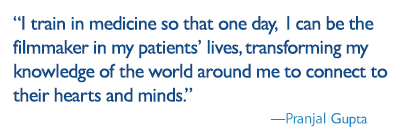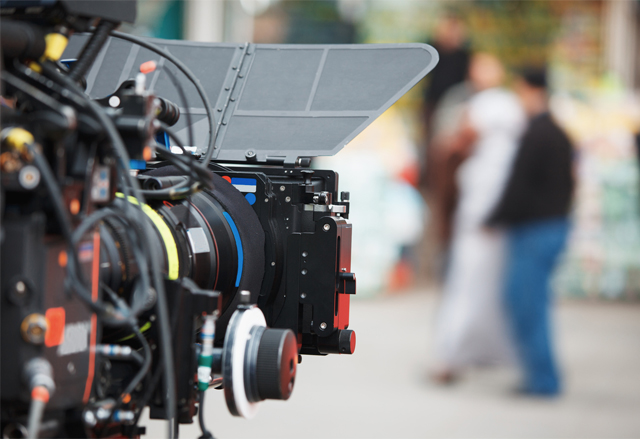The power of photons is amazing. In fact, every day, photons are trapped with sensors and converted to matrices of millions of numbers. By rearranging these matrices and converting them to electrical outputs and, eventually, back to new photons for our eyes to see, these photons can trigger powerful emotions in us—anger, laughter, happiness, even tears of grief. There is a name for this incredible process: filmmaking.
During my teenage years, I thought I wanted to become a filmmaker, until I realized that what I was actually passionate about were the engineering aspects of filmmaking. By taking simple shots of the world around me, and then transforming those basic components of light, color and sound, I could touch the hearts of others. Consequently, I decided to study engineering in college because the discipline gave me an opportunity to hone these skills—using tools and knowledge to manipulate the physical world and impact human lives. The discipline also guided my journey to medicine.
It was not until high school when I shadowed our physician neighbor for the first time that I was formally introduced to medicine. I was touched by how the application of the physician’s vast knowledge of biology, physiology and pathology allowed him to ultimately engineer medical lifestyle changes and complex treatment plans. It quickly became clear to me that the field of medicine shared the same fundamentals as engineering—the application of knowledge to the surrounding world.
 This theme resurfaced many times, and often in ways I did not anticipate—after a conversation at a medical volunteering opportunity with a man about his young granddaughter diagnosed with terminal leukemia, I felt surprisingly disillusioned and disheartened. Why wasn’t there any solution? According to my developing engineering paradigm of medicine, there was always a solution, and it simply required the correct rearrangement of chemicals to produce a drug or a more intricate understanding of physiology. However, instead of reciprocating the immense disillusionment I felt, the man expressed a deep sense of gratitude toward his granddaughter’s medical team. He discussed how, albeit the terminal diagnosis, the physicians around his granddaughter showed consistent compassion and commitment to providing the best care possible, and that alone provided the family strength. I was struck with the realization of a powerful human dimension of medicine that engineering otherwise did not provide. As my paradigm grew to encompass this understanding, so did my passion for medicine.
This theme resurfaced many times, and often in ways I did not anticipate—after a conversation at a medical volunteering opportunity with a man about his young granddaughter diagnosed with terminal leukemia, I felt surprisingly disillusioned and disheartened. Why wasn’t there any solution? According to my developing engineering paradigm of medicine, there was always a solution, and it simply required the correct rearrangement of chemicals to produce a drug or a more intricate understanding of physiology. However, instead of reciprocating the immense disillusionment I felt, the man expressed a deep sense of gratitude toward his granddaughter’s medical team. He discussed how, albeit the terminal diagnosis, the physicians around his granddaughter showed consistent compassion and commitment to providing the best care possible, and that alone provided the family strength. I was struck with the realization of a powerful human dimension of medicine that engineering otherwise did not provide. As my paradigm grew to encompass this understanding, so did my passion for medicine.
I entered medical school because medicine is a unique, intricate combination of engineering and the human connection, and I aspire to use the fundamentals of science from the classroom to eventually transform the world around me through my career. More importantly, beyond scientific transformations, I want to be able to offer empathetic and supportive comfort in hopes of providing the most compassionate care. I train in medicine so that one day, I can be the filmmaker in my patients’ lives, transforming my knowledge of the world around me to connect to their hearts and minds.
Related Content
- Seeing the Whole Person: Patient Experience Concierges Listen, Advocate and Solve Problems
- Primary Care 101: Clerkship brings Johns Hopkins medical students face to face with patients and community doctors.
- Practicing Humanistic Medicine: Read more insights from Dr. Paul Rothman, Dean of the medical faculty and CEO of Johns Hopkins Medicine, about how caring doctors make better doctors.
